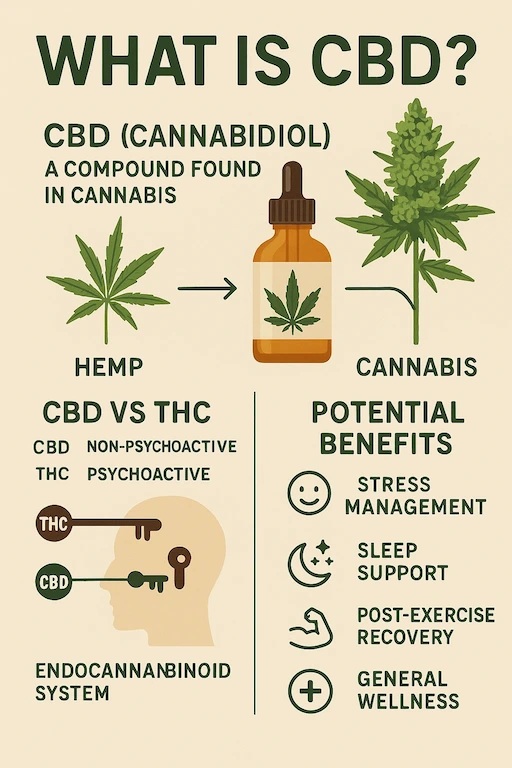Fact vs. Fiction: Demystifying Common CBD Myths and Misconceptions

The buzz around CBD is undeniable, but with any popular trend comes its fair share of myths and misunderstandings. From confusing it with its psychoactive cousin to misinterpreting its legal status and potential side effects, there's a lot of noise out there. It's time to turn up the signal and tune into the facts! Let's debunk some common CBD myths and equip you with the accurate information you need to navigate the world of cannabidiol with confidence.
Myth #1: CBD Will Get You "High"
The Truth: This is perhaps the most prevalent misconception, and it's crucial to set the record straight. CBD (cannabidiol) is non-psychoactive, meaning it won't produce the intoxicating "high" associated with THC (tetrahydrocannabinol), the primary psychoactive compound in cannabis (World Health Organization - Cannabidiol (CBD) Pre-Review Report). CBD and THC are different compounds with distinct effects on the body's endocannabinoid system. While THC binds directly to CB1 receptors in the brain, CBD interacts with the ECS in a more indirect way, often modulating the effects of other cannabinoids. So, you can rest assured, CBD won't leave you feeling altered or impaired.
Myth #2: CBD is Illegal Everywhere
The Truth: The legal status of CBD varies depending on its source and the specific regulations of different regions. In the United States, the 2018 Farm Bill federally legalized hemp and hemp-derived products containing less than 0.3% THC on a dry weight basis (U.S. Food & Drug Administration - Hemp Production and the 2018 Farm Bill). However, state laws can still have their own nuances and restrictions. Internationally, the legality of CBD also differs significantly from country to country. It's essential to research the specific laws in your location and any places you might be traveling to. Generally, hemp-derived CBD with low THC is becoming increasingly accepted, but it's not universally legal.
Myth #3: All CBD Products Are Created Equal
The Truth: This couldn't be further from the truth! The quality and composition of CBD products can vary wildly. Factors like the source of the hemp, the extraction methods used, and the presence of third-party testing all significantly impact the final product. Low-quality or unregulated products may contain inaccurate CBD levels, harmful contaminants (like heavy metals or pesticides), or undisclosed amounts of THC. This is why choosing reputable brands that provide Certificates of Analysis (COAs) from independent labs is absolutely crucial for ensuring you're getting a safe and effective product.
Myth #4: CBD Will Make You Fail a Drug Test
The Truth: As we discussed in a previous post, this is a nuanced issue. While CBD itself isn't typically what drug tests screen for, many CBD products, especially full-spectrum options, can contain trace amounts of THC (under the legal limit). Depending on the sensitivity of the drug test and individual factors, this THC could potentially lead to a positive result. To minimize this risk, individuals concerned about drug testing should opt for CBD isolate products, which should contain no THC, or broad-spectrum products that have had THC removed (though third-party testing is still essential to verify this).
Myth #5: More CBD is Always Better
The Truth: Not necessarily. While CBD is generally considered safe and well-tolerated, taking excessively high doses doesn't always equate to better results and can increase the risk of mild side effects in some individuals (Mayo Clinic - Cannabidiol (CBD)). It's always best to start with a low dose and gradually increase until you find the "sweet spot" that works for your individual needs. Paying attention to your body's response is key.
Myth #6: CBD is a Cure-All for Everything
The Truth: While research into the potential therapeutic benefits of CBD is promising, it's not a miracle cure for all ailments. Scientific understanding is still evolving, and while many people report positive experiences with CBD for various conditions, it's essential to have realistic expectations. CBD should not be seen as a substitute for conventional medical treatment or advice from qualified healthcare professionals. Always consult with your doctor about any health concerns and before using CBD as a complementary therapy.
Myth #7: CBD is Addictive
The Truth: According to the World Health Organization (WHO), "In humans, CBD exhibits no effects indicative of any abuse or dependence potential... To date, there is no evidence of public health related problems associated with the use of pure CBD" (World Health Organization - Cannabidiol (CBD) Pre-Review Report). CBD is not considered to be addictive and has a different mechanism of action than substances with known addictive properties.
Myth #8: You Can Overdose on CBD
The Truth: While research on the long-term effects of very high doses of CBD is still ongoing, current evidence suggests that CBD has a favorable safety profile, even at high doses. The WHO report mentioned earlier also notes that CBD is generally well-tolerated with a good safety profile. However, taking excessive amounts could potentially lead to mild side effects like drowsiness, dry mouth, or changes in appetite in some individuals. It's always wise to follow recommended dosages and listen to your body.
Myth #9: CBD Has No Side Effects
The Truth: While generally well-tolerated, CBD can have mild side effects in some people, particularly at higher doses. These can include drowsiness, diarrhea, changes in appetite, and fatigue (Mayo Clinic - Cannabidiol (CBD)). It's important to be aware of these potential effects, especially when starting CBD, and to adjust your dosage accordingly. CBD can also interact with certain medications, so it's crucial to discuss CBD use with your doctor, especially if you are taking other medications.
Debunking for a Brighter, More Informed Future
Navigating the world of CBD can be much smoother when you're armed with accurate information. By understanding the truth behind these common myths, you can make more informed choices about CBD products and use them with greater confidence and peace of mind. Stay curious, keep learning, and don't hesitate to seek out reliable sources for your CBD knowledge!